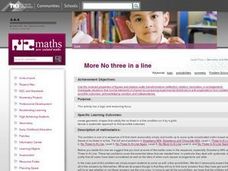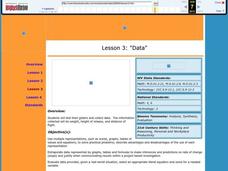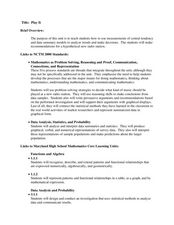Curated OER
Before, After, Between
In this logical reasoning worksheet, learners view 3 rows of pictures that show children in action. They follow directions that are listed at the bottom of the page to show before, after, and between.
Curated OER
Easter Egg Math
First graders apply logic and reasoning skills to solve math word problems. Using four colored paper eggs and four names, they try to soilve the logic puzzle by matching a name with a favorite color. Students check their answers on the...
Curated OER
No-Three-In-A-Line Game
Students use logic and reasoning to answer problems. Through interpreting information and results in the context to examine patterns. They examine how to solve the problems using strategy in mathematics.
Curated OER
More No-Three-In-A-Line
Fourth graders read Mary's problem and make sure that they examine it.
After some discussion, let the class work on the problem in their groups.
They then take turns in putting a picture of their arrangement on the board.
Arizona Department of Education
Area and Perimeter of Regular and Irregular Polygons
Extend young mathematicians' understanding of area with a geometry lesson on trapezoids. Building on their prior knowledge of rectangles and triangles, students learn how to calculate the area of trapezoids and other irregular...
ConnectED
Crime Scene Investigation
How exactly does a crime scene investigation work? The resource, a unit on criminology, covers everything from the deductive reasoning skills needed for detectives to DNA fingerprinting, all the way to how to gather evidence and bring...
Center for Mathematics and Technology
Whole Numbers: Using an Area Model to Explain Multiplication
There are many ways to work through a multiplication problem. Using an area model, kids complete several worksheets with different types of multiplication problems, including multiplying by ten, and explain how the new strategies differ...
Noyce Foundation
First Rate
Explore distance and time factors to build an understanding of rates. A comprehensive set of problems target learners of all grade levels. The initial problem provides distance and time values and asks for the winner of a race. Another...
Noyce Foundation
Lyle's Triangles
Try five problems on triangles. Levels A and B focus on shapes that can be created from right triangles. Level C touches upon the relationship between the area of a six-pointed star and the area of each triangle of which it is composed....
Noyce Foundation
Piece it Together
Score some problems all related to soccer balls. The first few problems focus on pattern blocks to see relationships between figures. More advanced problems focus on actual soccer balls, the patterns on the balls, and their volumes and...
Bowland
Fruit Pies
Scholars use formulas for the area of a circle and the area of a rectangle to determine the number of pies a baker can make from a particular area of dough. They must also take into account rolling the remaining dough into a new sheet.
National Museum of Nuclear Science & History
Alphas, Betas and Gammas Oh, My!
Referring to the periodic table of elements, nuclear physics learners determine the resulting elements of alpha and beta decay. Answers are given in atomic notation, showing the atomic symbol, mass, atomic number, and emission particles....
Bowland
Alien Invasion
Win the war of the worlds! Scholars solve a variety of problems related to an alien invasion. They determine where spaceships have landed on a coordinate map, devise a plan to avoid the aliens, observe the aliens, and break a code to...
Curated OER
The Race of Baseball All-Stars
Collect and analyze data. Pupils graph their data and model with it to solve real life problems. They use logic and deductive reasoning to draw conclusions.
Utah Education Network (UEN)
It's All Just Similar to Me
Middle schoolers explore the concept of similar figures. In this similar figures lesson, pupils calculate scale factors of similar triangles. They find missing sides of triangles, and measure angles using protractors and measure sides of...
Curated OER
Data
Students collect data from an experiment they perform. In this data lesson, students use multiple representations to solve practical problems; describe advantages and disadvantages of the use of each representation. Then, they evaluate...
Curated OER
What's Shaking? Three-Lesson Unit
Your young architects use the Internet to research tall structures or sky scrapers to help in the design of their scale drawings. This is lesson one of three in which learners design, build, and test model skyscrapers for seismic safety....
Curated OER
Graphs and Data
Students investigate poverty using graphs. In this algebra lesson, students collect data on the effects of poverty and use different rules to analyze the data. They graph and use the trapezoid rule to interpret the data.
Curated OER
Matrices: A Secret Weapon
Students perform operations with matrices. In this algebra lesson plan, students use cryptography and cryptanalysis to solve problems. They add, subtract, and multiply matrices.
Curated OER
Play It
There are a number of activities here that look at representing data in different ways. One activity, has young data analysts conduct a class survey regarding a new radio station, summarize a data set, and use central tendencies to...
Curated OER
Exploring Exponential Growth and Decay Functions
Pupils differentiate between exponential growth and decay. In this algebra lesson, students solve exponential equations using properties of exponents. They use the Ti calculator to graph and analyze their functions.
Curated OER
Critical Thinking - Week 11
In this critical thinking worksheet, students complete problems which require abstract reasoning and logic. They complete logic puzzles involving sums of an array, finding the maximum number of integers under given conditions, and card...
Curated OER
Let's Line Up!
In this reasoning instructional activity, 2nd graders use logical reasoning to determine what each person's place in line is. Students are given 4 questions to practice the skill.
Curated OER
Teach Students a Range of Problem-Solving Strategies
Arming students with a multitude of strategies will help them meet their math challenges.

























